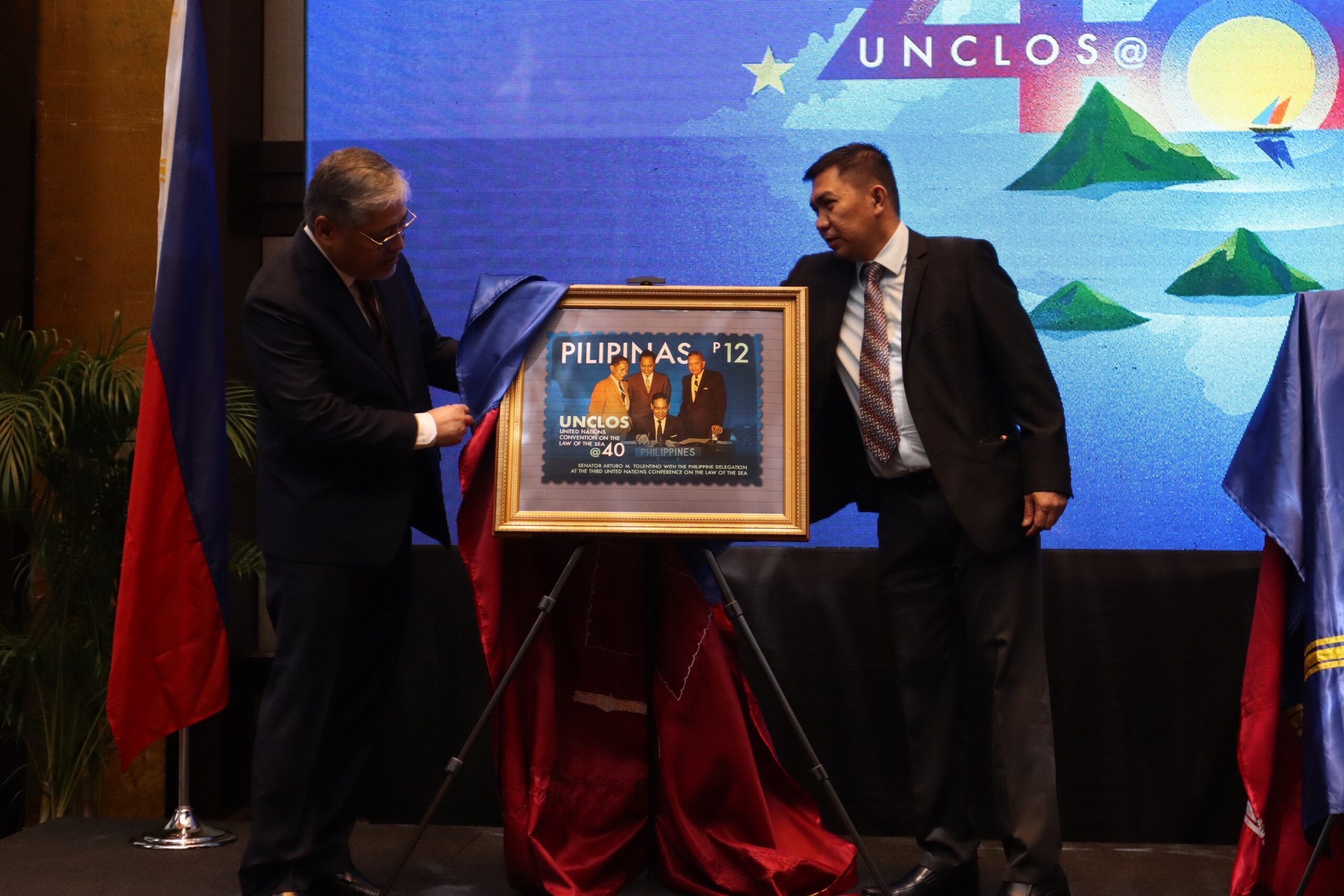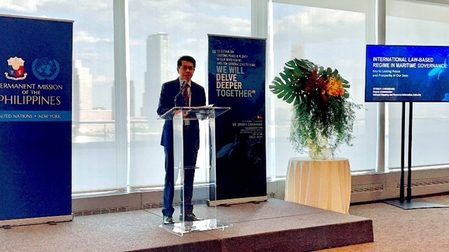SUMMARY
This is AI generated summarization, which may have errors. For context, always refer to the full article.

MANILA, Philippines – Forty years after the United Nations Convention on the Law of the Sea (UNCLOS) was adopted, the Department of Foreign Affairs (DFA) retraced its history and celebrated the landmark convention for its role in setting the maritime entitlements of coastal states, including archipelagic states such as the Philippines.
UNCLOS, also known as the “constitution of the oceans,” was the basis of the 2016 Hague ruling that struck down China’s expansive claim over the West Philippine Sea.
“As the country confronts a myriad of maritime challenges that are growing more complex through the years, I hope that our unwavering commitment to promote a rules-based international order will strengthen our resolve to ensure that UNCLOS will remain the linchpin of maritime governance for decades to come,” Foreign Secretary Enrique Manalo said in a conference of the DFA’s Maritime and Ocean and Affairs Office (MOAO) at the Diamond Hotel.
Setting the tone for the conference, DFA Undersecretary Carlos Sorreta gave a philosophical and political perspective on the archipelagic doctrine. Ambassadors Lauro Baja Jr. and Victor Garcia III, both UNCLOS III delegates, formed a panel with Sorreta to share insights during the negotiations and the signing of the convention.
MOAO Assistant Secretary Angela Ponce, who also spearheaded the conference, gave a brief presentation on the Philippines’ Baselines Law. She also shared what the DFA has been doing to make sure that Philippine laws are fully compliant with UNCLOS.
Overlapping claims common
Overlapping claims are not just confined to the West Philippine Sea – they’re actually quite common. The Philippines, in fact, shares maritime borders with a few other neighbors like Japan, Palau, and Indonesia.
During Ponce’s part, she talked about over 20 years of negotiations with Indonesia based on UNCLOS that has resulted in the successful delineation of the two countries’ exclusive economic zones.
“We’re always very proud of it – the delimitation was done through rules-based and amicable negotiations. This is the model for future negotiations not just for us, but for other states as well,” Ponce said.
National Mapping and Resource Information Authority (NAMRIA) Deputy Administrator Efren Carandang was part of the panel with Ponce and UP Law Associate Professor Jay Batongbacal. Carandang recently won a seat at the United Nations (UN) Commission on the Limits of the Continental Shelf (CLCS). He will hold the said seat from 2023 to 2028.
They also discussed the next steps in protecting the country’s archipelagic domain. Batongbacal shared his two cents on how the filing for the extended continental shelf, already established in the Philippine Rise, is only the first of many steps. He added that despite having the Philippine Rise on the eastern seaboard, the Philippines must not forget to file for recognition of its extended continental shelf in the West Philippine Sea as well.
UNCLOS and the West Philippine Sea
DFA Assistant Secretary Henry Bensurto, who was part of the team that took China to court over the West Philippine Sea dispute, narrated the events that led to the filing of the case, the trial itself, and the reaction to the ruling released in 2016.
“We’ve benefited a lot from UNCLOS. It has helped us. I think it’s time that we give back and the arbitration ruling is our way of giving back to world and regional peace,” Bensurto said.
Senior State Counsel Fretti Ganchoon, who was part of the legal team against China, also shared how the ruling is binding even if China did not join the proceedings. Under Article 287 of UNCLOS, once a party ratifies the convention, they have to specify a preferred dispute mechanism. If they do not, it is automatically decided that they accept arbitration.
“Article 286 allows for unilateral initiation of arbitration. There is already consent,” Ganchoon said. “So we just needed to initiate arbitration proceedings. And it’s also very clear that non-participation of a party is not a bar to the proceedings.”
DFA Assistant Secretary Domingo Nolasco of the Office of Treaties and Legal Affairs led the last session on maritime scientific research, from its importance to the challenges the country is facing in furthering its knowledge of its own waters and what lies beneath.
The DFA and PhilPost also launched a commemorative postal stamp featuring the Philippine delegation, led by Senator Arturo M. Tolentino, at one of the sessions of the Third UN Conference on the Law of the Sea. It was unveiled by Manalo and Philippine Assistant Postmaster General Francis T. Cereno at the beginning of the conference. – Rappler.com
Add a comment
How does this make you feel?















![[Rappler Investigates] When China, Leila, Sara conspire](https://www.rappler.com/tachyon/2024/06/saraduterte-west-ph-sea-leila-de-lima-newsletter-june-27-2024.jpg?resize=257%2C257&crop=279px%2C0px%2C720px%2C720px)



![[Just Saying] SONA 2024: Some disturbing points](https://www.rappler.com/tachyon/2024/07/TL-marcos-sona-points-july-23-2024.jpg?resize=257%2C257&crop=335px%2C0px%2C720px%2C720px)

There are no comments yet. Add your comment to start the conversation.